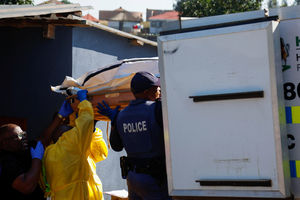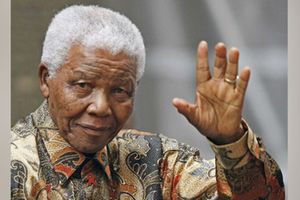
A voter fills out ballots at a polling station during a special voting day, ahead of South Africa's general elections to elect a new National Assembly, in Cape Town, South Africa, May 27, 2024.
South Africa’s global posture may be one of the key issues at stake as voters gather at polling stations this Wednesday to elect their most popular party to head their government.
And it has been billed as the biggest test for the African National Congress, the continent’s oldest liberation movement, currently facing a challenge from upcoming rivals.
ANC, in power since 1994 is expected to score the lowest in the election, opinion polls show, but not necessarily lose both hands on the jar of power.
That could force it to reach out to rivals to form an alliance, in case the score drop falls below 50 percent of the vote.
If a coalition emerges, however, it could also bring a compendium of ideologies, some at crossroads with the ANC’s stand.
Dozens of new parties and individual players on the political playing field have given the 27.79 million registered voters more choices than ever before, making the permutations of possible outcomes a dizzying set of wildly different scenarios.
Depleted ANC
The emergence of uMkhonto we Sizwe (MK, translated as Spear of the Nation), with still-popular former president Jacob Zuma at its head, has morphed South African politics into a far less predictable pattern than any time since the dawn of democracy in 1994.
But that is only a theoretical alliance prospect, as Zuma himself has said that MK would never ally itself with an ANC led by current party and national President Cyril Ramaphosa.
Julius Malema’s far-left Economic Freedom Fighters (EFF), whose support appears to have been at least partially eroded by MK’s sudden appearance with Zuma as its figurehead, could, again in theory, play precisely the same role for a support-depleted ANC.
But if the party founded in 1912 as an Africanist liberation movement ‘over-performs’ the expectations of polling experts, it could still rely on two, three or even smaller parties to assure itself of a bigger majority.

John Steenhuisen, the leader of the Democratic Alliance, addresses supporters at an election rally in Benoni, South Africa May 26, 2024
In that scenario, ANC domestic and foreign policy will probably barely shift.
One or more overtly Islam-friendly groupings could easily be combined, for example, with other minor parties in an ANC-led ruling alliance.
Such an outcome would make South Africa – already proving to be a bane for Israel, in its conflict with Hamas in and around Gaza, by repeatedly taking the Netanyahu administration to the International Court of Justice – even more fiercely opposed to what Pretoria under the ANC describes as ‘anti-Palestinian apartheid’.
Anti-West groupings
Also unknown, for now, is South Africa’s future role in the growing collective bloc of BRICS (Brazil, Russia, India, China and South Africa) states.
A yet more assertive ANC-led ruling alliance of this type would continue an essentially ‘non-aligned’ position, meaning Washington and London may not be happy, but anti-West groupings throughout Africa and beyond would be delighted.
With much in the way of development aid, especially from America, hanging in the balance – including support for this energy-troubled country’s effort to transition away from reliance on coal to more sustainable, and ‘just’, energy production systems – a drift by Pretoria towards an overtly anti-West posture may be restrained.
But falling shorter in the vote count than expected means the ANC cannot hope for such a relatively ‘easy’ outcome.
In which case, it is either deal with the much-criticised, by the ANC, and Democratic Alliance – which would be ‘good for business’, domestically and internationally – or be forced to work with either the EFF or MK.
Can the ANC include both these entities in governance? Some observers have said there are seemingly unresolvable personality issues between Zuma and Malema, who once as an ANC Youth League leader vowed to ‘die for Zuma.’
However, only a short while later, he was leading opposition party efforts to force Zuma from power, which was achieved in 2018.
No love lost
That means there is no love lost between these two leaders. Add that to the fact that Zuma will have nothing to do with the ANC, which means any such ‘alliance of major parties’ must be with either the EFF or the DA.
The Democratic Alliance is itself an unlikely teammate for the ANC, having formed a loose association with other ‘moderate’ parties trying specifically to oust the ANC.

South Africa President Cyril Ramaphosa speaks at the Congress of South African Trade Unions National Worker's Day rally at Athlone Stadium in Cape Town, South Africa, May 1, 2024.
Both these options are nearly just as troublesome as one with MK.
The dynamics between the ANC and EFF are every bit as fraught with danger for the ANC as would be with the neo-liberal DA.
On the one hand, the ANC would lose much of its international support were it to ally with the EFF, plus a flight of capital, disinvestment and other blows to follow.
Historically, the ANC's strategic behaviour and potential alliances have been mainly pragmatic and cautious.
The ANC is self-described as a ‘broad church’ of interest groups, causing policy divisions which have prevented the ANC from adopting and imposing a more hard-left set of goals.
But if the ANC is forced to bow to the requirements of whomever it manages to partner with to stay in power, this will inevitably mean shifts in international relationships that are heavy with implications.
An alliance with the EFF would, for example, work for Moscow, Beijing and North Korea, but hardly anyone else, while a currently ‘impossible’ alliance with the MK party of Zuma’s construction would likely drive away international investors in droves, triggering a foreign currency crisis, that likely leading to the ‘printing of money’ and runaway inflation, as seen in Zimbabwe and Venezuela.
All these projected outcomes being, in the medium to long term, ‘bad for the ANC’, make for a deeply troubling set of choices for the party of the still-beloved Madiba.










